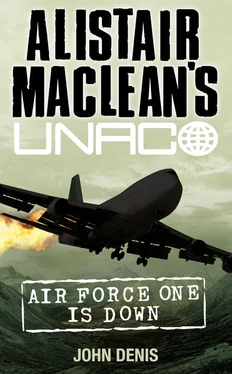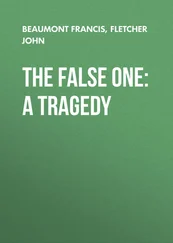JOHN DENIS
Alistair MacLean’s UNACO Air Force One Is Down
HARPER
Cover
Title Page JOHN DENIS Alistair MacLean’s UNACO Air Force One Is Down HARPER
ONE
TWO
THREE
FOUR
FIVE
SIX
SEVEN
EIGHT
NINE
TEN
ELEVEN
TWELVE
THIRTEEN
FOURTEEN
FIFTEEN
SIXTEEN
By Alistair MacLean
ALISTAIR MACLEAN’S AIR FORCE ONE IS DOWN
Copyright
About the Publisher
Mister Smith’s watch had long since been taken from him, so he logged the passing seconds in his head. Not all of them, but enough to keep him in touch with reality.
No natural light penetrated the cell, for he was a Category ‘A’ convict, rating a top-security tomb. No everyday sounds of the world outside reached his ears through the solid old walls of Fresnes Prison.
In three years, even during his twice-daily canters round the exercise yard, not a single aeroplane engine had Smith heard, nor the dying snarl of a lorry, nor the aimless twittering of a sparrow.
His hearing had become abnormally and selectively acute, sifting the mélange of man-made, purposeful noises for the odd accidental one to disturb the relentless pattern of normality. But these were few, scattered like grace notes through an otherwise pedestrian score. Yet still, and obsessively, Smith listened – for the catch in the footfalls of his guards that meant a broken step, for the clang of a dropped key and the curse that always followed it, for the scraping of a match as a warder unknowingly bestowed on Smith the priceless gift of lighting a cigarette outside his cell.
These sounds, after a while, slotted subliminally into his mind, and were used by Smith to fuel his determination to avoid mental stagnation in his solitary confinement. He owned one of the truly original criminal minds of the century, and had no intention of letting it rust into disuse.
He exercised his body ruthlessly to keep his muscles finely toned, and drilled his brain no less fanatically with complex chess and bridge problems committed to memory. And when he had dispatched these, he would reconstruct in perfect detail the greatest achievements of his long career, and go on to plan those yet to happen.
That they would happen, Smith never doubted. He had known with a cold certainty on the day that the forces of the United Nations Anti-Crime Organisation defeated his commando army on the Eiffel Tower, that no prison could hold him beyond his calculated tolerance.
Now he had tolerated Fresnes Prison for long enough. Smith had rarely spoken, still more rarely smiled, during his incarceration. But as he sat on his bunk and squinted at the naked light-bulb which he had come to think of as a trusted friend, the ghost of a grin touched his lips.
While his brain schemed at a feverish pitch, he dropped his eyes and absent-mindedly sketched with a fingernail on the palm of his hand the ragged outline of an aeroplane. And he whispered a name.
‘Dunkels.’
Dunkels was Smith’s creature, dragged from the gutters of Berlin. Smith had made Dunkels rich, and fear of Smith kept the German loyal. The time had come for Dunkels to repay his master, to be the catalyst of Smith’s freedom, and of the crime he would perpetrate and which would rock the Western world.
‘Dunkels,’ Smith breathed again, drawing comfort from the sound, for sounds were precious to him. Dunkels would not let Mister Smith down. No one ever did that.
The Swissair DC-9 started its lazy descent into Zurich airport. The ‘No Smoking’ sign came on in the first-class compartment, and Siegfried Dunkels obediently mashed his cigarette into pulp with elegantly powerful fingers.
He teased a flake of ash from the crease of his blue mohair trousers and glanced out of the cabin window. White puffs of cumulus danced on the snow-topped Alpine peaks, basking in their Christmas card complacency under an otherwise china-blue sky. His thin lips twisted. Dunkels detested the smug Swiss, but envied and feared them, too, for their effortless success and smooth financial brigandry. He had been bested, cheated, by Swiss money-men in the past; it would not, he vowed, happen again.
No Zurich gnome had ever beaten Mister Smith, Dunkels mused; and he was in Switzerland on Mister Smith’s business. Nothing must go wrong. On Dunkels’ life, nothing must go wrong.
A pert stewardess, confidently pretty, stopped by his seat and glanced meaningfully at his lap through lowered lids. She was merely checking that his seat-belt was fastened, yet she made it seem like an invitation.
‘I trust,’ Dunkels said in German, ‘that your Swiss doctors are more amenable than your bankers.’
‘I beg your pardon?’ said the girl.
‘You have it,’ Dunkels rejoined, stretching his mouth into a smile.
Fawn-coloured sunlight flooded into the aircraft as the pilot turned on to his final approach. A priest in the window seat struggled with the mini-blind, and Dunkels reached across him to flick it expertly down and mask the sudden glare. The priest bowed his thanks. Men of God, Dunkels thought, should not travel first class. It did not demonstrate a proper humility, though he doubted whether one such as his companion, clearly a bishop, would even bother to affect an attitude of humility.
The tension of the landing mounted in the cabin, and was reflected by seasoned travellers like Dunkels who steeled themselves for the touch-down. A sigh of relief escaped from the bishop when the DC-9’s wheels rode safely on to the tarmac. The prelate crossed himself, and started to say something to Dunkels, who pretended, with an exaggerated pantomime, to be deaf.
Later, Dunkels hefted his alligator-skin case from the baggage-carousel and strolled past the deferential Swiss douaniers to the automatic exit doors. A uniformed chauffeur standing by a black Mercedes signalled to him with a gloved hand. The driver indicated the front passenger seat, but Dunkels pointedly waited for the rear door to be opened. Just as pointedly, he insulated himself from the possibility of small-talk on the journey by leaving the limousine’s plate-glass partition closed.
Dunkels did not look through the tinted window at the breathtaking scenery, but into it at his own reflection. He saw, and admired, a square-jawed, firmly fleshed face with a slightly kinked nose jutting aggressively under his deceptively mild brown eyes. The chin was adequately cleft and the forehead broad and bland. His eyebrows, like his hair, were ash-blond. The hair was kept short and sculpted by an Italian barber who was an artist with a razor. Dunkels drew a comb from his pocket and ran it across his scalp. In its wake, the individual hair follicles snapped smartly back into place like Prussian guardsmen.
A fleeting shadow intruded on his self-absorption. Dunkels frowned and peered more closely. Then he grinned. It was an aeroplane. A Boeing 707.
The undulating silhouette was not unlike the shape Smith had traced on his hand in the Fresnes Prison.
The dignified italic script on the sign said ‘Edelweiss Clinic’ in English, and Dunkels mentally switched to English for the period he was to stay there; a short time, he hoped. Like Smith, Dunkels was an accomplished linguist – though without Smith’s encyclopaedic command of esoteric tongues. Dunkels had known Smith to range languidly through the alphabet from Albanian to Xhosa purely for mental stimulus.
Gravel crackled beneath the wheels of the Mercedes when it left the main road and turned into the clinic’s long drive. Edelweiss, Dunkels assumed, would be an unwelcome intruder into the probably regimented sterility of the clinic, which at last came into view through the front window. It was a newish, chalet-style complex nestling in a fold of the mountain, and built out from it to overlook the vertiginous drop to a rock-strewn valley. Patients of Doctor Richard Stein who were unable to afford his treatment, or failed to benefit from it, could solve their problems simply by walking off his expensive terracing, Dunkels thought. He spread his long, spare body over the rear seat of the Mercedes and waited for the chauffeur to release him. A white-coated figure came out through the swing-doors and descended the steps towards him.
Читать дальше












